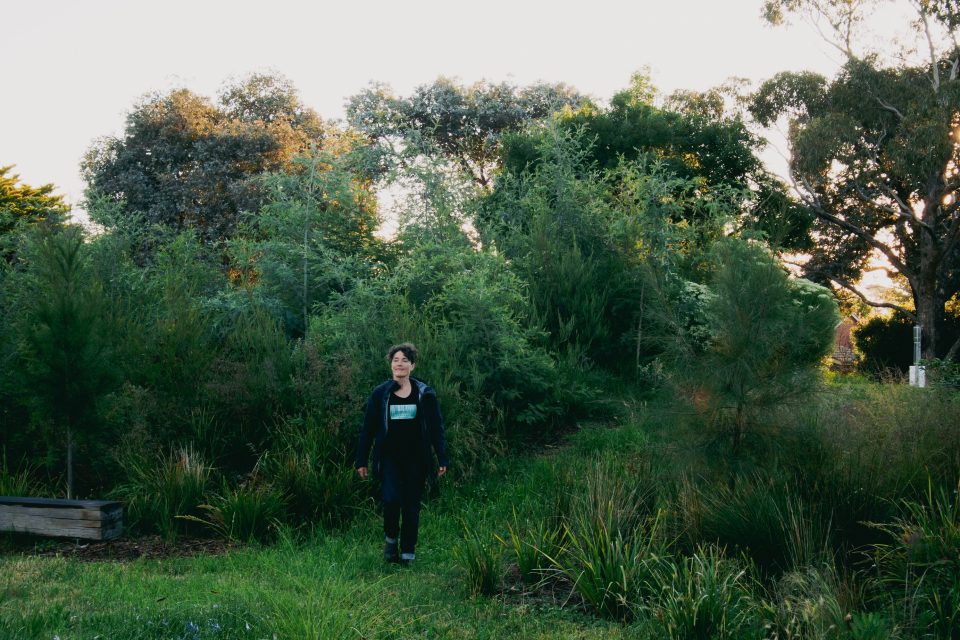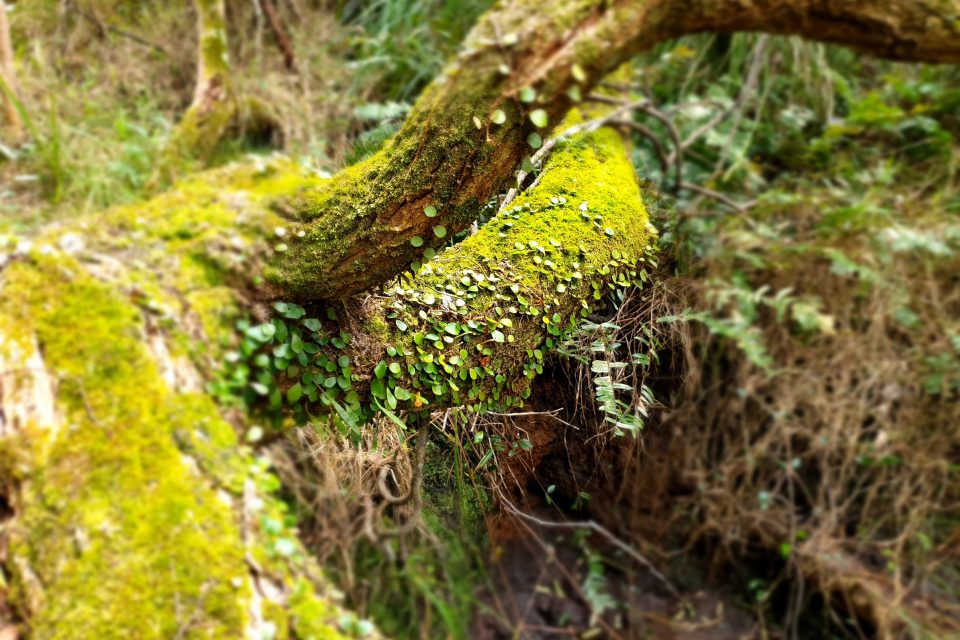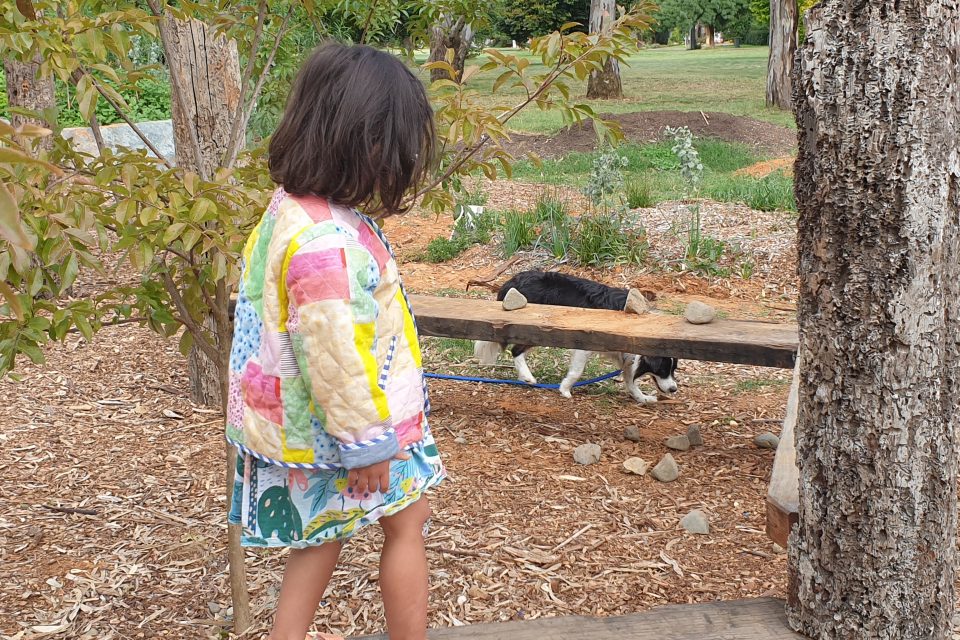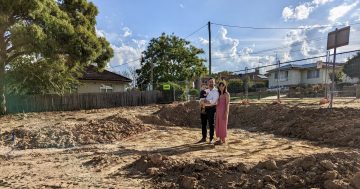
Supporters of the Moruya micro-forest project are seeking community support. Photo: Gillianne Tedder.
The community has thrown its support behind the Eurobodalla’s first micro-forest project, raising more than $18,000 in just 12 days.
Landscape architect and driving force behind Canberra-based social enterprise The Climate Factory, Edwina Robinson said she was surprised by the swift response to the Pozible crowdfunding campaign to develop an urban oasis in the grounds of Moruya’s St John’s Anglican Church.
“I’m really thrilled because we didn’t know what the acceptance of it would be in the community,” she said.
“We have surpassed our minimum target of $17,000 and we hope to raise a total of $34,000 to complete the project.”
She said a lot of the financial support had come from Canberrans who had seen the results in their city firsthand.
The dense pocket of endangered local dry rainforest will cover an area of 500 square metres and will be designed to both cool the landscape and create wildlife habitat.
Edwina said the micro-forest would be planted by community members and maintained for three years. After that time it will be self-supporting.
“As well as planting 1500 local rainforest plants into organically enriched soil, we will include water harvesting, open spaces for gathering, broad pathways and seating,” she said.
It’s expected the micro-forest will become a focal point of the Moruya township, close to local businesses and schools.
“It will become a really nice park and will be a lot more diverse that the other parks we have along the riverfront,” Edwina said.
“Once established community groups can hold events in the forest and families can take a picnic and just sit and contemplate nature.
“If we can raise enough money, we want to incorporate seating and a dry creek bed for nature play – kids love those sorts of things.”
The local plants will be sourced from small pockets of remnant dry rainforest on nearby privately-owned properties and planted densely using the Japanese Miyawaki method which results in plants growing up to 10 times faster than usual.
“The rainforest will have water harvesting trenches underneath to slow down the rainwater and keep it on site, and in really hot, dry extreme weather water will be available for the plants.
“The water and all the plants together have a huge cooling effect.”



Edwina said she was inspired to establish the micro-forest in Moruya, not only to provide a nature park and to educate the community about how small dense plantings can cool the environment, but also after seeing the impact the Black Summer bushfires had on the town.
“2019 was Australia’s hottest and driest year on record, the bushfires came to the edge of town and burnt bush and paddocks, and people died,” she said.
“Post fires and COVID, here’s a grassroots project that we can do together to help our environment and bring people together.
“There’s a lot of climate anxiety in the community and what we’re doing gives people hope for the future.
“It’s also a chance to reconnect with one another and nature.”
She says the site in the church grounds was ideal for the project which is also home to the Red Door bushfire haven.
“The micro-forest will be an outdoor heatwave haven. It’s in the perfect location, close to the main street and within walking distance to primary schools,” Edwina explained.
“We were offered the site by the Reverend Linda Chapman that she originally wanted to convert into an English common. She is really passionate and supportive of the project.”
Local schoolchildren will be invited to help with the planting and the park will provide an ideal outdoor learning space for a “forest classroom” where kids can learn about the different types of rainforests and enjoy the natural surroundings.
Horticulture students from Moruya TAFE will grow rainforest plants for the project.
Since 2020 Edwina has been the driving force behind three climate-cooling micro-forest projects in Canberra and said it was a model that could “really work for the community”.
“It’s a project that is funded by and created by the community, for the community,” she said.
“We don’t have to wait for government funding.
“This will be the first one in the Eurobodalla and we want it to be a pilot project and also a demonstration to other communities.
“Our vision is to empower local leaders to build a climate-cooling micro-forest in every urban hotspot in Australia.”
The organisers will hold community engagement sessions around the design and development of the micro-forest.
The funds raised so far will pay for the landscape and water harvesting design, as well as earthworks that will underpin the project.
The earthworks and water harvesting will commence in Autumn 2023, and the micro-forest will be planted soon after.
The goal is to achieve $34,000 to cover the costs of community engagement, 1500 native rainforest plants and tree guards, site superintendence and landscaping materials. Any additional funds will provide nature play for children, fixed seating and signage.
Community members can donate to the Pozible fundraising campaign HERE by 14 November to help get the project off the ground.








